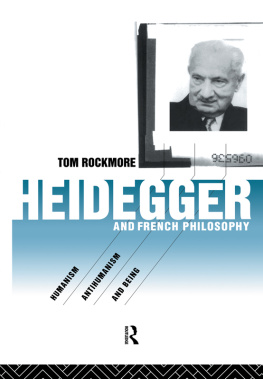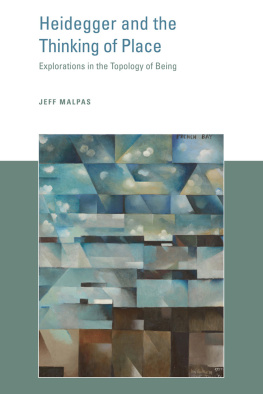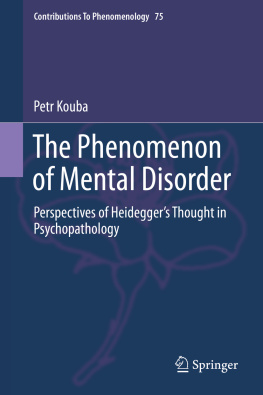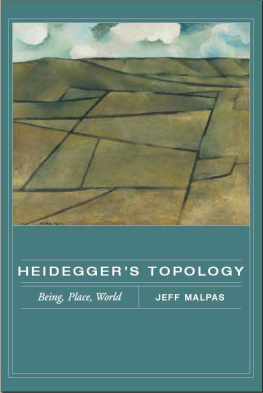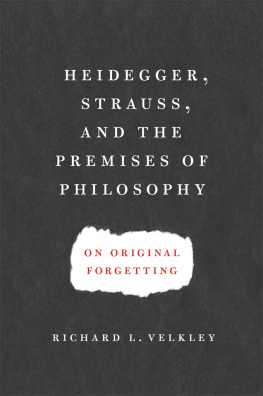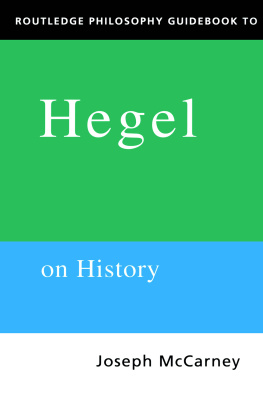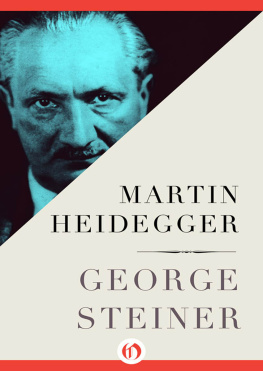Heidegger Martin - Heidegger and French philosophy: humanism, antihumanism and being
Here you can read online Heidegger Martin - Heidegger and French philosophy: humanism, antihumanism and being full text of the book (entire story) in english for free. Download pdf and epub, get meaning, cover and reviews about this ebook. City: London;New York (N.Y, year: 1995, publisher: Routledge, genre: Religion. Description of the work, (preface) as well as reviews are available. Best literature library LitArk.com created for fans of good reading and offers a wide selection of genres:
Romance novel
Science fiction
Adventure
Detective
Science
History
Home and family
Prose
Art
Politics
Computer
Non-fiction
Religion
Business
Children
Humor
Choose a favorite category and find really read worthwhile books. Enjoy immersion in the world of imagination, feel the emotions of the characters or learn something new for yourself, make an fascinating discovery.
- Book:Heidegger and French philosophy: humanism, antihumanism and being
- Author:
- Publisher:Routledge
- Genre:
- Year:1995
- City:London;New York (N.Y
- Rating:5 / 5
- Favourites:Add to favourites
- Your mark:
- 100
- 1
- 2
- 3
- 4
- 5
Heidegger and French philosophy: humanism, antihumanism and being: summary, description and annotation
We offer to read an annotation, description, summary or preface (depends on what the author of the book "Heidegger and French philosophy: humanism, antihumanism and being" wrote himself). If you haven't found the necessary information about the book — write in the comments, we will try to find it.
Heidegger and French philosophy: humanism, antihumanism and being — read online for free the complete book (whole text) full work
Below is the text of the book, divided by pages. System saving the place of the last page read, allows you to conveniently read the book "Heidegger and French philosophy: humanism, antihumanism and being" online for free, without having to search again every time where you left off. Put a bookmark, and you can go to the page where you finished reading at any time.
Font size:
Interval:
Bookmark:
How is it that a difficult German philosopher widely known to have been an enthusiastic Nazi became one of the master thinkers of postwar French philosophy?
Heidegger and French Philosophy examines the reception of this highly influential and controversial thinker in France. Tom Rockmore traces the way in which Heideggers theory has redefined and largely determined the nature of philosophical debate in France, and he investigates the background against which philosophers from Sartre through Lacan and Foucault to Derrida, Irigaray and Lacoue-Labarthe have adopted Heideggers thinking. In doing so, Rockmore delineates some of the main aspects of the French philosophical tradition in particular its deep humanist commitment.
By arguing for a contextual interpretation of Heidegger, the author engages with the controversy over the philosophers political affiliation with Nazism and the debate on whether or not this commitment can be reconciled with current French philosophy and its use of Heideggers theory. Heidegger and French Philosophy examines the relations between Heideggers philosophy and his politics, and contends that for the most part the French reception of his theory first as philosophical anthropology and later on as post-metaphysical humanism is systematically mistaken.
Tom Rockmore is Professor of Philosophy at Duquesne University, Pittsburgh. His most recent books include On Heidegger s Nazism and Philosophy and Hegel and Contemporary Philosophy.
Humanism, antihumanism and being
Tom Rockmore

London and New York
First published 1995
by Routledge
2 Park Square, Milton Park, Abingdon, Oxon, OX14 4RN
Simultaneously published in the USA and Canada
by Routledge
270 Madison Ave, New York NY 10016
Transferred to Digital Printing 2008
1995 Tom Rockmore
Typeset in Times by
Ponting-Green Publishing Services, Chesham, Bucks
All rights reserved. No part of this book may be reprinted or reproduced or uti1ized in any form or by any electronic, mechanical, or other means, now known or hereafter invented, inc1uding photocopying and recording, or in any storage or information retrieval system, without permission in writing from the publishers.
British Library Cataloguing in Publication Data
A catalogue record for this book is available from the British Library
Library of Congress Cataloging in Publication Data
Rockmore, Tom, 1942
Heidegger and French Philosophy: humanism, antihumanism
and being / Tom Rockmore.
p. cm.
Inc1udes bibliographical references and index.
1. Heidegger, Martin, 18891976-Influence.
2. Philosophy, French-20th century.
1. Title.
B3279.H49R618 1994
193dc20 9347961
CIP
ISBN: 0-415-11180-3 (hbk)
ISBN: 0-415-11181-1 (pbk)
Publishers Note
The publisher has gone to great lengths to ensure the quality of this reprint but points out that some imperfections in the original may be apparent.
HEIDEGGER AND THE MASTER THINKER IN FRENCH
PHILOSOPHY
HEIDEGGERS LETTER ON HUMANISM AND FRENCH
HEIDEGGERIANISM
One of the pleasures of publishing a book is that it provides the occasion to express gratitude for help received in carrying out the project. I would like to record my appreciation to the Noble J. Dick Foundation for a grant that allowed me to acquire books and other materials; to Dr. John J. McDonald, Dean, Arts and Sciences, Duquesne University, for kindly funding a short trip to France that allowed me not only to read a paper but above all to do research in the Bibliothque Nationale in Paris; and to the American Philosophical Society for a fellowship that enabled me to spend a longer period in the same library.
Denken ist die Einschrnkung auf einen Gedanken, der einst wie ein Stern am Himmel der Welt stehen bleibt.
More than 200 years ago, astronomers speculated that a star of sufficient size would, owing to its gravitational pull, absorb rather than emit light and would therefore exert an enormous influence while remaining, literally, invisible.
In an earlier work,
Study of the French reception of Heideggers theory is interesting for three main reasons. First, it offers an occasion to delineate some main aspects of the French philosophical tradition, in particular its deep humanist commitment, extending over centuries, that is crucial to the reception of Heideggers theory in France. Second, it represents a special case of the wider, but little understood relation of philosophy to the history of philosophy. We simply do not know how philosophy relates to the philosophical tradition, nor how philosophical theories are taken up in the later discussion. Third, it provides an opportunity to learn something important about Heideggers theory through study of its French reception. Simply put, this book contends that in the period after the Second World War, Heidegger became the master thinker of French philosophy, the main French philosopher; and it further contends that for the most part the French reception of Heideggers theory, to begin with as philosophical anthropology and later as postmetaphysical humanism, is systematically mistaken.
The impact of Heideggers theory in France since the end of the Second World War is comparable to Kants in Germany after the publication of the Critique of Pure Reason toward the end of the eighteenth century. Some philosophers were uninterested in Kants theory and a few opposed it. But for the most part, it dominated the immediate post-Kantian discussion in German philosophy. Some French philosophers are uninterested in Heideggers theory and others reject it; but for more than half a century it has continued to exert a decisive influence in French philosophy that still gives no clear signs of abating.
The nature of Heideggers philosophical dominance in France after the Second World War can be suggested through a Kantian concept. In a famous passage, Kant employs the astronomical metaphor of the Copernican Revolution to describe the central organizing function of the subject with respect to the objects of possible experience and knowledge. If to an increasing extent since the end of the war Heidegger has become the master thinker of French philosophy, if Heideggers theory is central to French philosophy today, if it forms the horizon in which French philosophy formulates its problems and seeks their solutions, then it is literally comparable to the Kantian subject, the transcendental unity of apperception, in transmitting its categories to the debate, in structuring the French philosophical discussion.
Heideggers philosophical importance is mainly due to his brilliant early work, Being and Time. When this book appeared in 1927, its genuine importance was quickly recognized, and its author was propelled to the center of the philosophical stage almost before the ink was dry on its pages. Otto Pggeler compares the appearance of this treatise to a flash of lightning that illuminated the philosophical landscape in a new way so that things could no longer remain as before.
Koyrs contention can be read as a prediction that actually came true in France. An even more radical view is passionately embraced by certain of Heideggers French followers. Franois Fdier, one of the French philosophers closest to Heideggers thought and since Jean Beaufrets death one of Heideggers most tenacious French defenders against the view that his philosophy and his Nazism are directly related, as an attack on French philosophy.
Font size:
Interval:
Bookmark:
Similar books «Heidegger and French philosophy: humanism, antihumanism and being»
Look at similar books to Heidegger and French philosophy: humanism, antihumanism and being. We have selected literature similar in name and meaning in the hope of providing readers with more options to find new, interesting, not yet read works.
Discussion, reviews of the book Heidegger and French philosophy: humanism, antihumanism and being and just readers' own opinions. Leave your comments, write what you think about the work, its meaning or the main characters. Specify what exactly you liked and what you didn't like, and why you think so.

